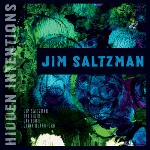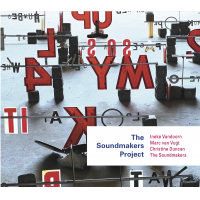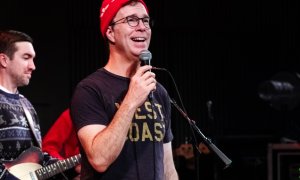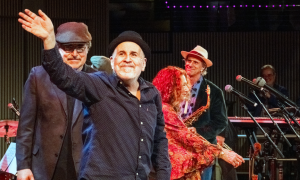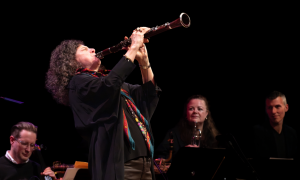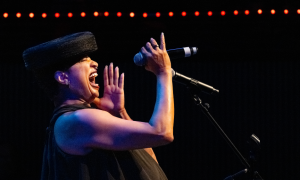Home » Jazz Articles » Live Review » Ottawa Jazz Festival Day 1: June 21, 2007
Ottawa Jazz Festival Day 1: June 21, 2007
 While the Ottawa International Jazz Festival, sponsored by the The Toronto-Dominion Bank (TD), has always taken pride in the breadth of its programming without deviating from a near-exclusive focus on the jazz spectrum, it faces the same annual harsh reality of other festivals devoted to the genre. Supporting a multifaceted program of lesser-known and up-and-coming artists can make it necessary to bring in acts that are, at best, peripherally related to jazz. That said, the 2007 edition, running from June 21 to July 1, is a closer stylistic fit than the 2006 run which, though strong, was not without some missteps. With artists ranging from the well-known and mainstream (Dave Brubeck, Branford Marsalis, Dizzy Gillespie All-Star Big Band) to the left-of-center (Kris Davis, Instant Composers Pool, aka ICP, and New Jungle Orchestras), not to mention some special-event shows (Bill Frisell, Toots Thielemans/Kenny Werner, Roy Haynes), the 2007 OIJF offers a highly diverse and widely appealing program. Yet it's far more than just a little something for everyone.
While the Ottawa International Jazz Festival, sponsored by the The Toronto-Dominion Bank (TD), has always taken pride in the breadth of its programming without deviating from a near-exclusive focus on the jazz spectrum, it faces the same annual harsh reality of other festivals devoted to the genre. Supporting a multifaceted program of lesser-known and up-and-coming artists can make it necessary to bring in acts that are, at best, peripherally related to jazz. That said, the 2007 edition, running from June 21 to July 1, is a closer stylistic fit than the 2006 run which, though strong, was not without some missteps. With artists ranging from the well-known and mainstream (Dave Brubeck, Branford Marsalis, Dizzy Gillespie All-Star Big Band) to the left-of-center (Kris Davis, Instant Composers Pool, aka ICP, and New Jungle Orchestras), not to mention some special-event shows (Bill Frisell, Toots Thielemans/Kenny Werner, Roy Haynes), the 2007 OIJF offers a highly diverse and widely appealing program. Yet it's far more than just a little something for everyone.
The OIJF also remains one of the best bargains on the jazz festival circuit. $180 gets you into every show, with the exception of the three special event shows (a nominal additional fee for these), including the 5:00 PM Connoisseur Series at Library and Archives Canada, the 6:30 PM Great Canadian Jazz and 8:30 Concert Under the Stars series (both at the large outdoor stage at Confederation Park), the short but always intriguing 8:00 PM Improv Invitational series at the National Arts Centre's Fourth Stage and the equally diverse 10:30 PM Studio series at the NAC Studio. That's 42 concerts over 11 days, not including a wealth of other free shows by local artists, and the late-night jam sessions, back again in the capable hands of local treasure, bassist John Geggie.
Less expensive passes get you into subsets of the various series, with an economical $40 student pass providing access to the Confederation Park concerts, Studio and Improv Invitational series—an attempt to face another undeniable need: to attract more young people to jazz festivals.
Chapter Index
Day one got off to a great start at the Connoisseur Series, where Danish trumpeter Jens Winther, who last appeared here with drummer Ed Thigpen at the 2005 festival, brought his own quartet, featuring fellow Danes, pianist Ben Besiakov and bassist Jonas Westergaard, and German drummer Dejan Terzic for a set of all-original material that ran the gamut from impressionistic and ethereal to relentlessly energetic. It was the first date of a cross-Canada festival tour for Winther, but the chemistry of his quartet was so potent that it felt more like the end of a run, when communication and interplay are often honed to a greater degree.
Winther exhibited a rich, full-bodied tone on both trumpet and flugelhorn, clearly influenced by mid-1960s Miles Davis. Like Davis, Winther tended to favor the middle register, but when he did venture into the upper end of his instrument, as increasingly occurred as the pace of the ninety-minute set picked up, his robust tone remained intact, never becoming brash. Opening with a spare composition that provided both the trumpeter and Besiakov plenty of room in which to move, the quartet sounded how, perhaps, Miles' mid-1960s quintet with Herbie Hancock, Wayne Shorter, Ron Carter and Tony Williams might have sounded had it incorporated some of the transparency of German label ECM's aesthetic. Terzic was particularly impressive—fluid, elastic and responsive.

While the majority of the set maintained a strong pulse, the quartet often distributed it in ways insuring no single instrument was defining it. Instead, it was the combination of a number of rhythmic fragments, a structure resembling a house of cards: if a single instrument dropped out, all forward motion would fall apart with it. It made for an exciting set, regardless of feel and tempo, as the rhythmic emphasis shifted amongst Besiakov, Westergaard and Terzic.
The six-song set featured extended, often episodic, compositions by Winther. The aptly titled "Mercury" was, indeed, mercurial, with a brisk and complex theme that ultimately opened up, traveling from elastic funk to fiery swing. Clearly a group conversant with the tradition, it nevertheless applied a contemporary spin that, at times, made it difficult to know just how much was scripted and how much was the result of the quartet's clear simpatico.
As the energy of the set increased and Winther began to demonstrate a more virtuosic, high velocity approach to soloing, the group opened up even more—sounding how Miles Davis' late 1960s work might have sounded had it remained acoustic and less sonically dense. Still, the quartet knew how to create a narrative with its set list, the balladic "Honesty" providing some well-needed relief. Winther, starting the tune on flugelhorn but later switching to trumpet, ended the song a capella, creating a wash of sound by blowing into the piano and causing the string to vibrate sympathetically underneath his spare phrases.
It was a set that housed considerable liberty for all within a multilayered structural framework—the perfect start for the Connoisseur Series, long considered one of the festival's best and most consistent features. class="f-right">
Following an entertaining 6:30 PM set by the Tango Nuevo group Norteño, saxophonist Branford Marsalis and his long-standing quartet took the stage at Confederation Park for a set that was tailored to a more general festival audience. Marsalis' performance at the 2007 Portland Jazz Festival was a considerably more intense affair, with more inherent risk. It's to Marsalis' credit that he understands the difference between performing in an indoor ticketed venue, where attendees are typically more familiar with the artist, and an outdoor festival, where a significant portion of the audience is attending all outdoor shows without necessarily having intimate knowledge of the artists' work.
That's not to suggest that there were artistic compromises in what Marsalis and his quartet—rounded out by pianist Joey Calderazzo, bassist Eric Revis and drummer Jeff "Tain" Watts—delivered over the course of its 100-minute set. Marsalis' extended rubato tone poem, "Cassandra," demonstrated, forty minutes in, that you can lead a more general audience to places it might not normally go by gradually pulling it in first with more accessible fare.
 Marsalis may not have played with the kind of urgency that he often does, but he was in a playful mood that proved infectious. Irving Berlin's often-covered "Cheek to Cheek" was given a rhythmic work- over, turning the familiar melody into a more idiosyncratic affair, with time shifts and unexpectedly mischievous stops and starts before settling into more straight-ahead swing for strong, assured solos from Calderazzo and Marsalis.
Marsalis may not have played with the kind of urgency that he often does, but he was in a playful mood that proved infectious. Irving Berlin's often-covered "Cheek to Cheek" was given a rhythmic work- over, turning the familiar melody into a more idiosyncratic affair, with time shifts and unexpectedly mischievous stops and starts before settling into more straight-ahead swing for strong, assured solos from Calderazzo and Marsalis.
Marsalis alternated between tenor and soprano saxophones throughout the show, robust and focused on the former, lithe, lyrical and equally centered on the latter. Calderazzo, who performs solo at the Connoisseur Series tomorrow, has matured from a post-McCoy Tyner modal player into a more widely versed pianist, whose solos seem to build with a paradoxical inevitability that makes them compelling, whatever the context. Revis anchors the group, though he's an equally fine soloist, carefully balancing melodic ideas with a pronounced rhythmic approach. Watts is a powerhouse drummer who can build intensity at the drop of a hat but is always the collaborative rhythm section partner, with his occasional bursts behind whoever is soloing always relevant and never meaningless non sequiturs.
Marsalis' performance may have been more lightweight (or, perhaps, light-hearted and playful) than usual, but there was no sacrifice of substance, making it an entertaining, successful and well-received opener for the festival's Concert Under the Stars series. class="f-right">
The 10:30 PM Studio series, often the place to hear more experimental music with an edge, also got off to a strong start with New York-based pianist Kris Davis and her quartet, featuring saxophonist Tony Malaby, bassist Eivind Opsvik and drummer Jeff Davis. Kris originally hails from Calgary, Canada and, like Jens Winther, this performance is the first of a series of dates at jazz festivals across the country. Operating with the tried-and-true philosophy that touring new material is the best way to prepare it for recording, Davis will be heading into the studio immediately after the tour to record her follow-up to The Slightest Shift (Fresh Sound New Talent, 2006) and Lifespan (Fresh Sound New Talent, 2004).
Davis' quartet has remain unchanged since Lifespan, permitting it to grow organically and meet the increasingly rigorous demands of the pianist's writing. Opening the set with the far left-of-center "My Resurrection," the two Davises created an aggressive pulse, with Kris literally hammering dissonant block chords with her closed fists, Cecil Taylor-style. But interspersed with this more angular passage was a softer, more abstract passage during which Malaby's tenor and Opsvik's arco bass meshed seamlessly, at times in unison, elsewhere creating dissonant but strangely appealing harmonies.
Davis' music has often more closely resembled a kind of new music chamber aesthetic, despite the more jazz-centric instrumentation. Remaining more in the background and leaving Malaby as the more dominant voice, she would often develop repetitive, minimalist patterns that evolved so gradually as to be near- imperceptible. Her own approach to improvisation, whether soft or aggressive, felt more akin to careful consideration than reckless abandon.
 Malaby, an underappreciated talent who has, nevertheless, been garnering increasing recognition through his work with bigger names such as pianist Fred Hersch and bassist Charlie Haden's Liberation Music Orchestra, possesses the same breadth of extended techniques that made altoist John Zorn's solo performance at Victoriaville's 2007 FIMAV festival so compelling. Multiphonics, percussive abstracts, odd blowing techniques and more make up Malaby's larger sonic palette. But, for a saxophonist of inimitable if not limitless technique, Malaby's focus is always on the music and, like his band mates, the ensemble rather than himself.
Malaby, an underappreciated talent who has, nevertheless, been garnering increasing recognition through his work with bigger names such as pianist Fred Hersch and bassist Charlie Haden's Liberation Music Orchestra, possesses the same breadth of extended techniques that made altoist John Zorn's solo performance at Victoriaville's 2007 FIMAV festival so compelling. Multiphonics, percussive abstracts, odd blowing techniques and more make up Malaby's larger sonic palette. But, for a saxophonist of inimitable if not limitless technique, Malaby's focus is always on the music and, like his band mates, the ensemble rather than himself.
The biggest surprise of the performance was Jeff Davis' kit work. Always an inventive player, let loose in a live context he was a veritable fountain of ideas, a more assertive American counterpart to Canadian drummer Dylan Van Der Schyff. From textural work to the almost rock edge of "Black Tunnel," Davis completed an outstanding triumvirate of stand-out drummers from this first day's three performances.
Opsvik, like pianist Davis, appeared generally more content to function in the background yet, like Kris, his contribution to the overall fabric of the material was no less significant. The Studio performance was far and away the most challenging of the day, but rewarded those who stayed ample rewards and the opportunity to hear new music in relatively germinal form.
Tomorrow: Pianist Joey Calderazzo solo; saxophonist Bill Evans' Soulgrass project; and singer Coco Zhao.
Visit Jens Winther, Branford Marsalis, Kris Davis and the TD Canada Trust Ottawa International Jazz Festival on the web.
Photo Credits
Jens Winther and Branford Marsalis: John Fowler
Kris Davis: John Kelman
Day 1 | Day 2 | Day 3 | Day 4 | Day 5 | Day 6 | Day 7 | Day 8 | Day 9 | Day 10 | Day 11
Tags
PREVIOUS / NEXT
Support All About Jazz
 All About Jazz has been a pillar of jazz since 1995, championing it as an art form and, more importantly, supporting the musicians who make it. Our enduring commitment has made "AAJ" one of the most culturally important websites of its kind, read by hundreds of thousands of fans, musicians and industry figures every month.
All About Jazz has been a pillar of jazz since 1995, championing it as an art form and, more importantly, supporting the musicians who make it. Our enduring commitment has made "AAJ" one of the most culturally important websites of its kind, read by hundreds of thousands of fans, musicians and industry figures every month.



